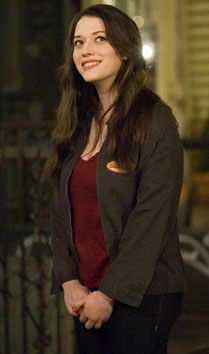 There’s a script that it seems I’ve been writing for the past 10 years. I’ll work on it for a while, get extremely frustrated, then push it aside in favor of something easier to write. Then the cycle repeats itself.
There’s a script that it seems I’ve been writing for the past 10 years. I’ll work on it for a while, get extremely frustrated, then push it aside in favor of something easier to write. Then the cycle repeats itself.
The problem? My protagonist, in this ill-fated script, is shy.
Sure, her character arc is obvious — she starts off shy and develops confidence as the movie progresses. The problem is that shy protatonists (girls or guys) are extremely difficult to make compelling to audiences. They tend to come across as passive (a big no no), or worse yet, wimpy and unsympathetic.
As such, shy protagonists are few and far between.
There’s Tobey Maguire’s portrayal of Peter Parker of course. But he gets to hide behind Spider-Man‘s mask, showcasing a latent wise-cracking, super-powered persona.
There’s Joan Wilder (Kathleen Turner) in Romancing the Stone (Amazon | IMDB). But that movie’s really a two-hander1, where Joan gets a lot of help from the charismatic Jack T. Colton (Michael Douglas).
And then there was Norah.
Today, I decided to watch Nick and Norah’s Infinite Playlist (Amazon | IMDB) — and something clicked.
If you haven’t seen the movie yet, and want to, this is your SPOILER ALERT.
The movie is a decent love story about a guy (Nick) and a girl (Norah) who bond during one crazy night, while searching for a drunk friend and a surprise appearance by their favorite band.
Like Romancing the Stone (and most love stories), this movie’s a two-hander. But Michael Cera certainly is no swashbuckler; he just does his odd Michael Cera thing.
The bright spot is the character of Norah, played superbly by Kat Dennings. She comes across as a typical, shy, trying-to-act confident, can’t quite find the right words, kind of high school girl. She has no superpowers or Juno-esque wit to help her. Yet somehow we’re drawn to her.
Why is she compelling?
Here’s the key — she’s shy, but has strong values that’s she’s forced to demonstrate.
She’s not sitting idly by relying on Michael Cera to save her. She’s actively making her own decisions. And what’s more, these decisions are difficult for her. She’s forced to either come out of her shell or compromise her values.
A few examples:
- Rather than let the bitchy girl make her look like a loser for not having a boyfriend, she walks up to Michael Cera (whom she doesn’t yet know) and gives him a kiss.
- When her best friend goes missing, she demands that the guys who lost her, help find her, instead of going to look for the band they want to see.
- When her on-again-off-again douchebag boyfriend tells her to deal with a bar tab, she risks pissing him off by leaving him to pay for it.
When push comes to shove, she doesn’t shrink away, or step back and let someone else save the day — she asserts herself. Even at the beginning of the movie.
It reminded me of a lesson that I first learned from Robert McGee’s book, Story. To paraphrase: Characters are the most fascinating when they’re forced to choose between two undesirable options.
The bottom line is…
If you want to write a screenplay with a shy protagonist, make sure you put her in situations where she’s forced to assert herself under difficult circumstances.
I think it may be time to take one more crack at my old script…
- A “two-hander” is a movie where there are two protagonists, each with their own character arcs. ↩




